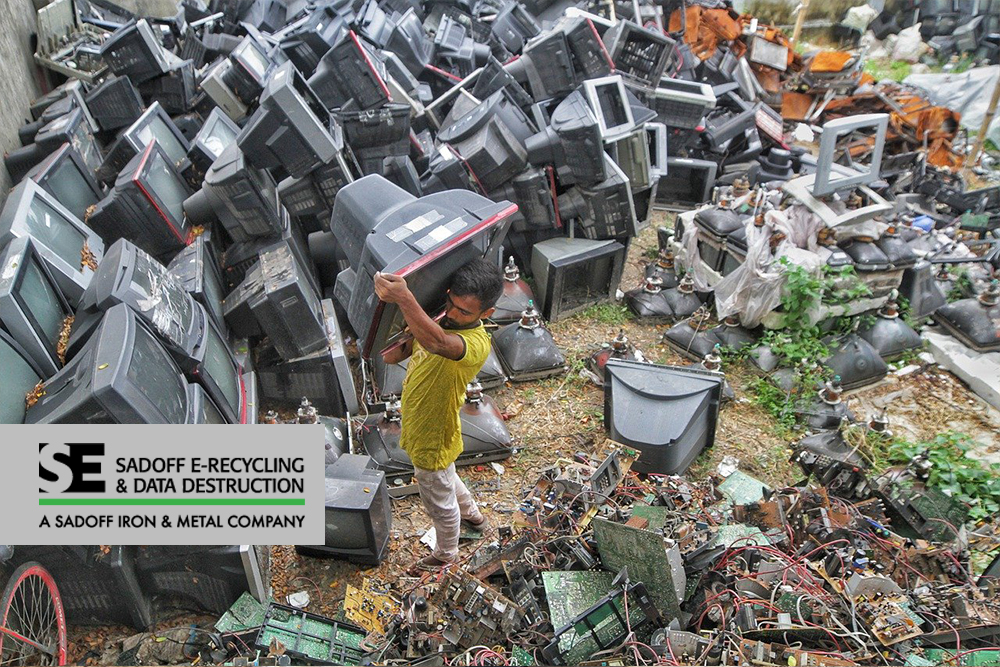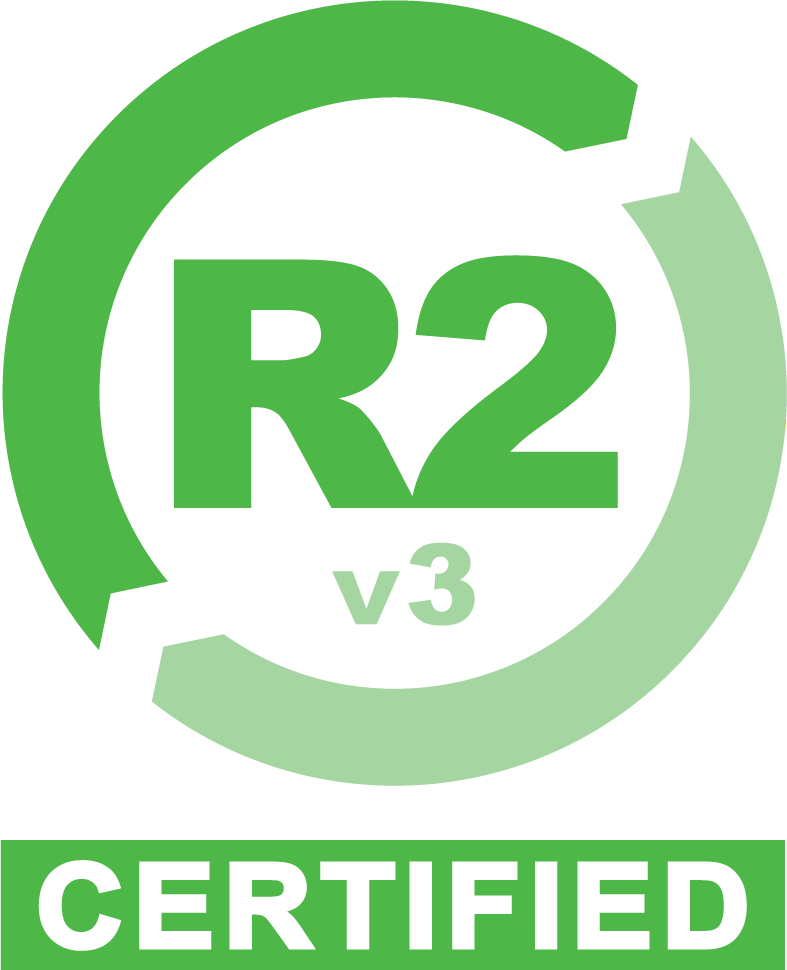What is E-Waste, Why is it a Problem, and Why Should I Care?
 12
12 May
The EPA defines electronic waste, or e-waste, as “used electronics that are nearing the end of their useful life and are discarded, donated or given to a recycler.” This includes home appliances, computers, handheld devices, home entertainment hardware, medical equipment, and a lot more. Basically, anything that includes any electronic components qualifies as e-waste.
It’s fairly simple to define what e-waste is, but far more difficult to sum up the complexity and magnitude of the myriad issues surrounding it. Reducing the amount of e-waste generated globally and managing the countless challenges of disposal and/or recycling has recently become a huge concern of special interest groups, private industry, and governments alike. Each has a variety of reasons for identifying and implementing solutions, but many private individuals are apathetic and struggle to see what impact these issues have on them directly, so international efforts are often stymied at a grass roots level.
What exactly ARE the issues surrounding e-waste?
E-waste brings with it many of the environmental problems encountered with items that are traditionally incinerated, dumped at sea, or end up in landfills, such as pollution, habitat destruction, and the senseless loss of precious natural resources. Unfortunately, it also harbors a host of additional issues that make it uniquely concerning.
Environmental – E-waste contains a long list of chemicals that are harmful to people and the environment. Substances like mercury, lead, beryllium, brominated flame retardants, and cadmium are common. When electronics are mishandled during disposal, these chemicals end up in our soil, water, and air. Many of these chemicals also produced pollutants when they were originally mined. Recycling them would generate significantly less pollution and use less energy than mining and processing new raw materials.
Natural Resources – Most e-waste contains an assortment of precious metals like gold and platinum, as well as various rare earth elements like cobalt and neodymium. As their name implies, these materials are difficult to obtain. Mining them is often difficult, dangerous, and expensive, plus there’s a finite supply that is dwindling rapidly. Electronic items that are simply discarded take with them valuable natural resources that could be easily reclaimed and recycled.
Human Rights – Electronic waste is sometimes illegally exported to countries that don’t have laws for handling and disposing of it properly. Once there, it’s simply dumped. Sometimes the most valuable materials are recovered, but the remainder is often left in piles, buried underground, or improperly incinerated, polluting the land, air, water of unsuspecting local citizens. When an effort is made to harvest materials, it often involves underage labor, low wages, and unsafe working conditions.
Data Security – Computers, handheld devices, and other computing equipment make up an ever-growing portion of the total e-waste produced worldwide. Any data storage components inside them, like hard-drives and flash memory, often contain sensitive or private information that could have significant detrimental effects on companies, organizations, and individuals if it got into the wrong hands. Proper “data destruction” is often overlooked before these items are disposed of.
Why do special interest groups, industry, and governments care so much about e-waste?
It’s not unusual for special interest groups, like environmentalists, for example, to be ahead of private individuals when it comes to recognizing and addressing these types of concerns. For these groups, issues pertaining directly to them are always top-of-mind and their resulting activism serves as the catalyst for governments to acknowledge the problem and take appropriate action.
Once lawmakers begin developing legislation to manage the issues, companies that have a vested interest in those laws take notice and make preparations for working within the framework of new laws and regulations. In the process, they develop the methodologies and technology necessary to comply while still making a profit.
The challenge then becomes convincing private citizens to get onboard with the new social paradigm and voluntarily comply with the laws and best practices that directly apply to them. This is especially challenging if compliance means additional personal effort or cost, or worse yet, a change of habit. In the case of e-waste, all three of these factors come into play—at least in the short term—as technologies, processes, and public opinion are still maturing.
Why should individuals care about reducing, recycling, and properly disposing of e-waste?
As instantaneous global communication and travel becomes cheaper, easier, and more reliable, the world becomes much smaller. Gone are the days of blissful ignorance where events in one region of the globe have little or no impact on people in other regions. Nowadays, a problem encountered locally or regionally can quickly develop into a national or global issue with far-reaching effects.
This is definitely the case with e-waste. While many of the related issues currently being encountered only impact individuals in a particular region, they’re quickly growing to become global issues whose effects will continue to trickle down to everyone.
- Environmental issues will be more acutely felt by individuals as larger areas become directly affected by the spread of tainted water supplies, increased air pollution, and overflowing toxic landfills. The resulting negative impact on the health of the general public will lead to a decreased quality of life and increased healthcare costs across the board.
- Rare natural resources and virgin raw materials will only become scarcer and more costly to acquire, inevitably increasing the cost of the products they go into.
- Human rights violations, and third world apathy to them, have never been acceptable, but the new global economy is creating opportunities to enforce international law that didn’t exist until just recently. The end result will be increased prices for products and raw materials supplied by those who have benefitted from these atrocities up until now.
- Data security will emerge as an even greater concern as the world becomes more connected. The shortage of companies like Sadoff E-Recycling and Data Destruction (SEDD), who are qualified to securely destroy data on storage devices, is going to become more evident. Certified data destruction is quickly becoming a necessary service for organizations and individuals alike, but are there enough providers to manage the upcoming surge in need?
What can I do to help address these e-waste and e-recycling issues?
The three keys to addressing the myriad issues relating to e-waste are education, influence, and action. Making a genuine difference doesn’t always require grandiose effort or extreme personal sacrifice. Look for opportunities to make an impact in these areas at a grassroots level:
Education – Now that you understand some of the reasons why these issues need to be addressed, share that knowledge with others whenever possible. While posting e-recycling information on social media or creating an instructional video for your YouTube channel would be extremely helpful, simply sharing information during conversations with friends, family, and coworkers can go a long way toward swaying public opinion on the topic.
Influence – Nothing makes a bigger impact on social behavior than our desire to conform with the actions and attitudes of our peers and those we respect. This is especially true with children. This is your opportunity to “walk the walk” and model behavior that is conducive to solving many of e-waste’s toughest problems. For instance, make sure that you not only dispose of electronics properly, but that you also make others aware of why and how you’re doing it.
Action – This is where the rubber hits the road. If you want to make a difference in the world, you need to start with the person in the mirror. Simple actions can make a huge difference. For example:
- Buy only EPEAT registered products from environmentally responsible manufacturers.
- Make an effort to identify companies that turn a blind eye to human rights violations within their supply chain and boycott their products.
- Vote for lawmakers and leaders who understand the need for more robust regulations regarding the reduction and management of e-waste.
- Spearhead or support the development of policies in your workplace or organization that address their particular e-waste issues.
- Patronize companies like SEDD who are working hard every day to find solutions to the challenges of e-waste.
The list of opportunities for education, influence, and action is endless. The question isn’t whether or not proper e-waste reduction and management will happen, it’s when it will happen. With each day that passes, our environment becomes more polluted, rare natural resource supplies dwindle, millions of people continue suffering social injustice, thousands of lives and companies are ruined by careless data breaches, and maintaining the trend toward cheaper electronics becomes more and more difficult.
If you’re ready to make a difference in your world, check out our website and blog for ways you can help address e-waste issues in your family, workplace, and community.
Tags: certified electronics recycler, data destruction, data security, e-recycling, E-Recycling Regulations, recycling IT equipmentCategorized in: Electronics Recycling, Sustainability




 Google map directions
Google map directions
 Google map directions
Google map directions
 Google map directions
Google map directions
 Google map directions
Google map directions
 Google map directions
Google map directions
 Google map directions
Google map directions
 Google map directions
Google map directions